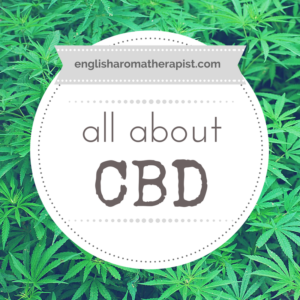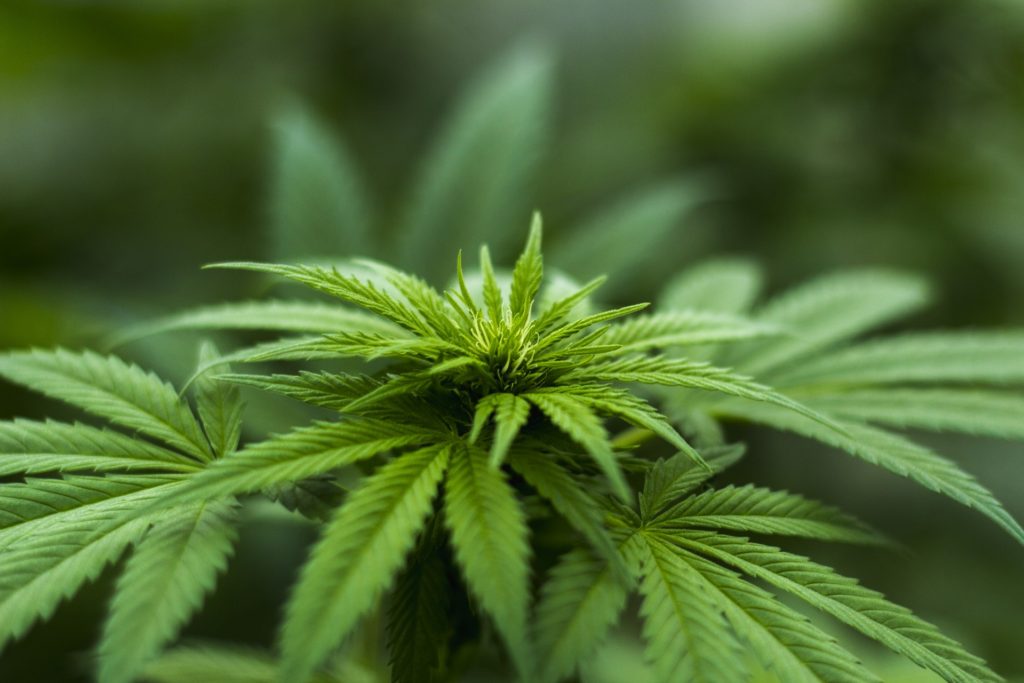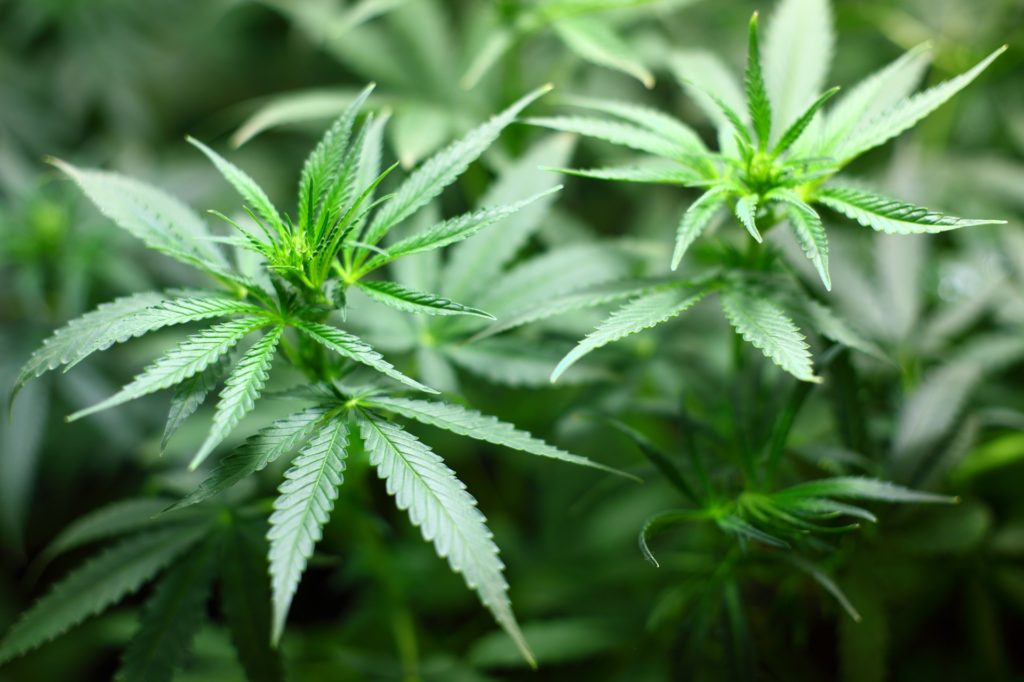All About CBD

If you’re an aromatherapy fan, you’ve probably heard the buzz about CBD. A few of you have asked me to write about this – particularly as there is a ton of confusion surrounding this issue.
There are many terms flying around – CBD, cannabis, hemp…what’s the difference? And is it the same as Copaiba?
I’m going to hold my hands up and say I don’t know a lot about CBD, and I have never personally used it. However, I’m certainly keen to discover more about this exciting avenue of health – after all, learning never ends!
So, I thought it would be useful to compile the information that’s out there. It’s certainly a quagmire!
Why haven’t I used CBD?
As one of the newer kids on the block, CBD oil wasn’t really around when I did my training – at least, it wasn’t commonly featured in textbooks or retail ranges.
CBD has only started to gain popularity relatively recently. Over the last couple of years the global CBD industry has exploded, and it’s already estimated to be worth £200m in the UK alone. And it’s claimed that the number of people using CBD in the UK has doubled over the past year.
There’s an enormous amount of interest in CBD – but, even now, it’s not always easy to obtain (see Is it Legal?).
CBD, Cannabis, Hemp…
The terminology can be confusing – is it hemp? Marijuana? Cannabis? Essentially, it’s all the same plant. Let’s clarify some terms:
-
Cannabis
Cannabis is a plant genus, and within it are three recognised species: Cannabis sativa, Cannabis indica and Cannabis ruderalis. There are also different strains of cannabis, which may be high in CBD or high in THC (or a 1:1 ratio).
-
Cannabis essential oil
‘Cannabis essential oil’ and ‘hemp essential oil’ are interchangeable terms for the same thing. This is steam-distilled from the leaves and flowers of the cannabis plant. Cannabis essential oil does not contain any meaningful amount of THC or CBD, but can be useful for helping pain and inflammation. It is legal and will not get you ‘high’.
-
CBD
The term CBD is short for cannabidiol (see below). CBD oil is not the same thing as cannabis essential oil.
-
Cannabidiol
This is one of the compounds – known as cannabinoids – found in cannabis. These compounds interact with cannabinoid receptors in the body. Cannabidiol is usually referred to as CBD.
-
THC
Along with CBD, THC is the most well-known cannabinoid found in the cannabis plant. THC stands for Tetrahydrocannabinol, and it’s responsible for the psychoactive properties associated with cannabis. In short, THC is what makes you get ‘high’.
-
Hemp
Although it’s scientifically the same plant, strains of cannabis with low THC are commonly called ‘hemp’. In the USA, the legal definition of hemp is a plant with less than 0.3% of THC. The term ‘hemp’ is often preferred in the context of industrial and commercial use (e.g. textiles, materials, food, skin care).
-
Marijuana
Strains of cannabis with high THC are commonly referred to as ‘marijuana’. Legally, this means cannabis that contains more than 0.3% THC. The term ‘marijuana’ (or marihuana) is normally used in the context of using cannabis for recreational drug purposes.
-
Hemp seed oil
While cannabis essential oil is often known as ‘hemp oil’, don’t mistake this for hemp seed carrier oil – which is a vegetable oil, rather than an essential oil. Hemp seed oil does not contain CBD.

What about Copaiba?
doTerra recently added Copaiba essential oil to their range and, following their corporate convention, many of their wellness advocates now believe the oil is a substitute for CBD.
I’ve seen it recommended as a kind of ‘safe and cuddly’ version of CBD, without any of the stigma or legal uncertainty. This has escalated into a rumour that I see mentioned on Facebook almost every day. I think it’s perhaps doTerra’s way of taking a slice of the juicy CBD market, without actually selling a controversial cannabis-related product.
The truth is that – while Copaiba has many benefits – it is very different from CBD. Plus – CBD is not an essential oil!
Is it legal?
What a minefield!
UK
In the UK, it is illegal to possess, grow, sell or distribute cannabis. It is a Class B drug. The only legal form is a prescription cannabis-derived drug called Sativex, which is not widely available.
However, CBD oil has been legal to buy since 2016, after being approved as a classified medicine under licence. It can also be legally sold as a food supplement, providing no medical claims are made.
(This is my understanding of the current situation – do get in touch if I am mistaken about this, or any other points in this article).
USA
In the USA, it is illegal to use or possess cannabis under federal law. However, the legality of cannabis varies at state level – in some states it’s illegal; in some states it’s legal; in others it’s legal for medicinal use only (find out more here).
Hemp-derived CBD oil is legal in all 50 states of America. Marijuana-derived CBD oil is not legal in all 50 states.
Other countries
Legal regulations are complex and changing all the time. This is the best compilation I have found to summarise the legality of cannabis by country (but does not specifically relate to CBD oil).
Does CBD oil make you high?
No – it does not contain THC, which is the compound in cannabis that gets you high.
Will you fail a drugs test?
Moderate use of CBD oil should not make you fail a drug test, as it does not contain THC.
However, it may contain trace amounts of THC which could, in theory, give a false positive result – depending on the type of test. From my understanding, this outcome is rare and not something to worry too much about.
What are the benefits of CBD?
CBD has been getting a lot of attention in the press recently, with claims it can help just about every condition from epilepsy to cancer. There’s a lot of anecdotal evidence that CBD can help with pain and inflammation. CBD doesn’t have psychoactive (‘high’) effects, but it can help to improve mood and reduce anxiety.
There are not thought to be any negative side-effects from using CBD oil.

Where can you buy CBD?
If you’re interested in trying CBD oil for yourself, do be sure to purchase from a reputable supplier. There are various strengths available, so it’s vital to do your research. As Dr Robert Pappas writes in this excellent post, it’s a case of “buyer beware”:
“The cannabis industry is relatively new and its booming. Because of this, it’s experiencing some of the same problems of large scale adulteration and outright fraud that the essential oil and mainstream extracts industry industries experienced decades ago. Don’t get me wrong, this still happens to a large degree in the essential oil and related industries as well, but not to the degree that it’s going on in the cannabis industry, where it’s basically the wild west all over again”
There certainly appears to be plenty of unscrupulous cowboys who are more than happy to jump on this bandwagon. Some “CBD hemp oil” products have been tested and found to contain virtually no CBD at all.
I’ve heard great things about Patriot Botanicals in the USA and LOVE CBD in the UK. If I discover more, I’ll update this page accordingly.
A cynic could be forgiven for thinking the governments are trying to make it as difficult as possible for people to get their hands on this natural resource, which offers so many potential health benefits… (but I’ll save the conspiracy theories for another day!)
Take-away points
- CBD oil is not an essential oil
- Cannabis essential oil does not contain CBD or THC
- Hemp-derived CBD oil is legal in the UK and USA
- CBD oil will not get you high
- CBD oil is unlikely to make you fail a drugs test
Find out more
More research is needed about this fascinating and much-misunderstood area of holistic health. Personally, I would love to find out more about CBD.
Legal regulations are continually under review, so it’s something to keep your eye on as this industry develops. Consumers need more impartial information about CBD products. Currently, there is far too much misleading and contradictory advice online.
This article is based on my understanding of the current situation – do get in touch if I am mistaken about any points raised. As I mentioned at the start, I am certainly no CBD expert.
Hemp is a hugely versatile and useful plant, but – due to confusion and misunderstanding about hemp and marijuana – its potential has not been optimised. It’s clear that CBD oil offers untapped benefits for health and wellbeing. I believe the social/legal stigma surrounding cannabis has resulted in a huge amount of reluctance to explore this area.
Further reading:
Cannabis by Elizabeth Ashley
Cannabis Confusion: Hemp, Marijuana, CBD and THC by Dr Robert Pappas
Is CBD Oil Legal? Depends on Where You Are and Who You Ask
The difference between Hemp and Marijuana
What is cannabis essential oil?
What to read next: Is this brand ok?
Follow me on...
Share this on...
